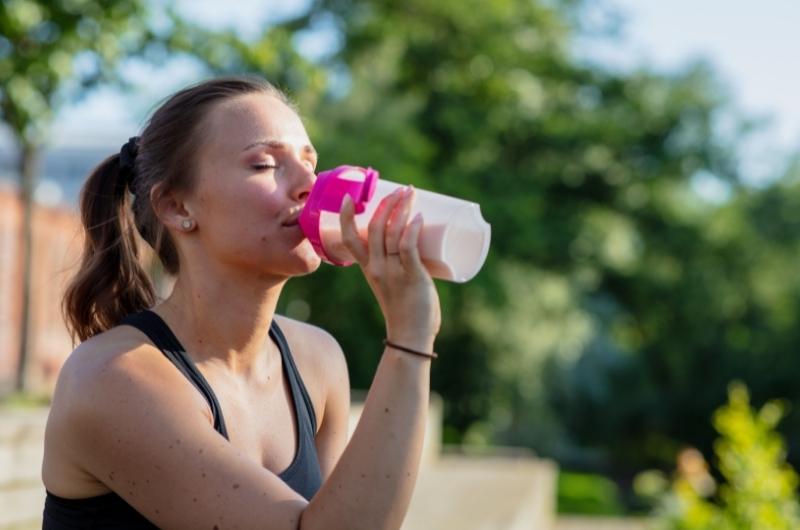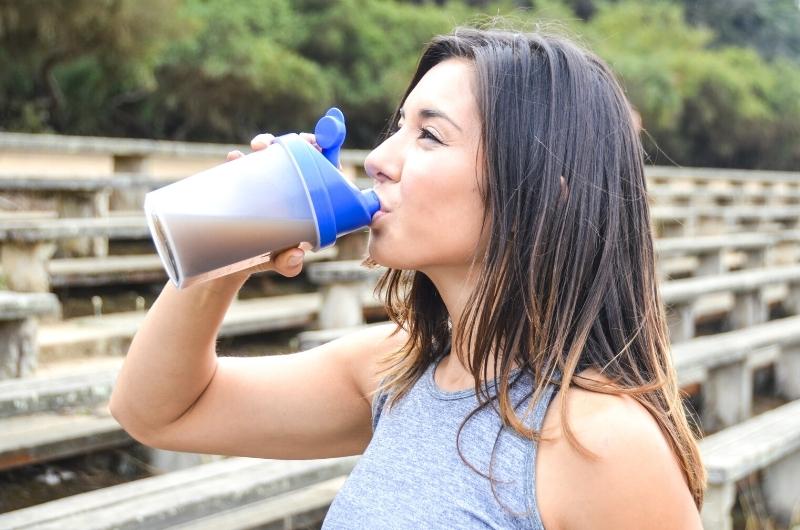Pregnant women can drink whey protein powders during pregnancy to help them achieve the recommended 70 to 100 grams of protein daily. Always check the labels of your protein powders to avoid any extra ingredients and added sugars. You should also buy unflavored protein powders. If you are lactose intolerant, you can try pure pea protein powders.
Even though there isn’t much scientific research about the effects of whey protein when consumed during pregnancy due to ethical concerns during this vulnerable time of women’s lives, protein is an essential organic compound needed by humans to sustain and build muscle tissue.
Even more so for pregnant women who need about 70 to 100 grams, depending on body weight and other factors such as daily physical activities, of protein daily to meet the demands of the growing baby.
Is it safe to consume whey protein during your pregnancy?
So is it safe to consume whey protein during pregnancy?
In moderation, yes.

Whey protein is an easy-to-digest, high-quality protein that can supplement a balanced diet when used as directed.
It can easily be incorporated into drinks, or pregnant women-safe protein shakes to achieve your body’s daily protein needs.
Whey protein is a natural protein from the watery portion of milk that separates from the curds when making cheese. When choosing the right brand for your protein powder, be sure to always check the ingredients.
Look for unflavored ones with very few added to no extra ingredients, chemical sweeteners, or added sugars.
If you’re lactose intolerant or sensitive to dairy, be sure not to take milk-based protein powders, such as whey.
Also, check protein powder labels for other milk ingredients such as lactose or casein. You can try pure pea protein powders or other vegan protein powders instead.
When should I start taking protein during pregnancy?
Protein is essential throughout pregnancy as it is crucial for your baby’s growth.
It is especially critical during your second and third trimesters, as your baby’s growing the fastest during these periods.
Is it safe to drink whey protein when breastfeeding?
You can drink whey protein during breastfeeding, as consuming enough amount of protein after giving birth helps mothers produce the nourishing milk their newborn needs.
Your body uses protein to produce breast milk and to sustain your growing baby. It also helps you maintain lean tissue while your body returns to normal.
The World Health Organization even recommends consuming an extra 25 grams of protein per day for the first six months of breastfeeding. However, the exact amount you need for your body depends on your weight and a variety of individual factors.
Some possible side effects of whey protein
Aside from the fact that there aren’t many clinical trials on the use of whey protein during pregnancy, higher doses can cause the following side effects:
- Acne
- Bloating
- Thirst
- Reduced appetite
- Nausea
- Increased bowel movements
- Headache
Always moderate your whey protein powder intake to avoid these side effects.
Six better protein sources for pregnant women
We may never be too sure of every ingredient in the protein powders you buy.
There are still toxic, unmentioned ingredients like metals or pesticides that manufacturers might fail to include.
Always remember that your pregnancy is a highly precarious time of your life. So it’s always better to know what exactly goes into the food or drink you’re consuming for your and your baby’s safety.
The following are excellent protein sources you could easily incorporate into your diet during pregnancy:
1. Yogurt (especially Greek yogurt)

Yogurt contains more calcium than most other dairy products and is especially beneficial. And as we also know, dairy products are also a great source of protein.
If you’re lactose intolerant, you may actually be able to tolerate yogurt, especially probiotic yogurt.
Always check with your doctor first if you could try it out.
2. Eggs
Eggs are like little packs of nutrition. They contain almost every little bit of nutrients you need during pregnancy.
Eggs are also a great source of choline, a vital nutrient needed during pregnancy as it helps in your baby’s brain development and helps prevent developmental abnormalities of your baby’s brain and spine.
3. Lean meats and chicken
These meats are a great source of high-quality protein.
They are also rich in iron, other B vitamins, and choline which you need during pregnancy.
4. Salmon
You might have been told to limit your seafood intake during pregnancy due to mercury and other contaminants you might get from them, but it is still safe to eat fatty fish like salmon.
Aside from being rich in protein, salmon is also a great source of vitamin D and omega-3 fatty acids.
5. Legumes
This includes peanuts, lentils, peas, beans, and chickpeas.
Legumes are not only a great source of plant-based protein, but they are also rich in fiber, folate, calcium, and iron.
6. Soy products

Soy milk is an excellent source of plant-based protein and calcium and a great alternative for pregnant women who are lactose intolerant. It’s also rich in omega-3 fatty acids.
Other soy products are tofu, tempeh, soy sauce, and soy nuts.
FAQs
What is the recommended daily protein intake for pregnant women?
Pregnant women should consume at least 70 to 100 grams of protein daily, depending on their weight and daily physical activities.
I’m lactose intolerant. What protein powder can I have?
You can try pure pea protein powders or egg protein powders. These are dairy-free alternatives for those who are sensitive to dairy.
Be sure to check the labels for casein or lactose, as these are milk ingredients.
What are natural protein sources aside from protein powders?
Natural protein sources are lean beef, pork, chicken, eggs, soy products, dairy, legumes, and salmon.
Conclusion
Whey protein powders are a good source of protein to consume during pregnancy.
Just be sure to always drink this in moderation, as too much of anything may lead to problems, especially during pregnancy.
You can take your doctor’s advice to avoid any inconvenience.


